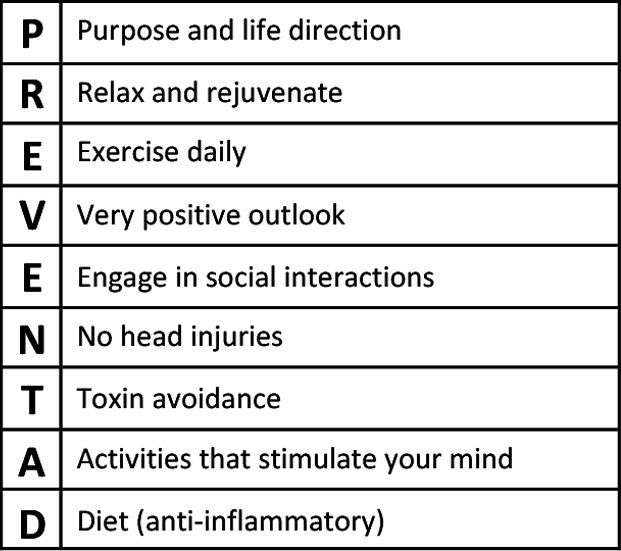By Nasser Razack, MD, JD
 Alzheimer’s has a devastating effect that many people take for granted. Let’s discuss nine ways to prevent the disease and promote better brain health.
Alzheimer’s has a devastating effect that many people take for granted. Let’s discuss nine ways to prevent the disease and promote better brain health.
1. Engage in brisk walking for at least 30 minutes five times a week. This can reduce Alzheimer’s disease risk by 33%. Vigorous aerobic exercise performed three times weekly for at least 20 minutes can also bring it down to 50%. Quite simply, exercise delivers more oxygen and nutrients to your brain, helps repair damage, and removes toxins.
2. Partake in activities that are interactive and mind-engaging. These include playing challenging games such as chess or bridge. Other activities include learning a new instrument or a new language; you can also partake in a new practice such as yoga. These new and diverse activities allow your brain to grow by forming more neural connections. In a sense, all these are also exercise for the brain.
3. Avoid toxins. For example, midlife smoking can double the rate of dementia. Smoking is a fairly obvious toxin, but we are also constantly barraged by other harmful substances throughout our life without knowing it. Please visit Cosmeticsdatabase.com to find out what toxins may be affecting your health. You can check any product you currently use to determine their toxicity.
4. Engage in social activities. A recent Harvard study demonstrated individuals with at least five strong social ties (people they enjoy spending time with) had a 50% reduced rate of cognitive decline compared to those who were more isolated.
5. Have a purpose and life direction. Researchers at Rush University Medical Center demonstrated that people with the highest level of purpose and direction in life had a 2.4-fold reduced risk of developing dementia. So find your passion, pick a cause that is meaningful to you, and work on it regularly!
6. Relax and rejuvenate. There are different ways to do this including prayer, meditation, exploring nature, reading a book, visiting the spa, getting a massage, doing yoga and other forms of exercise. This is important because the opposite of relaxation is stress which can actually damage your brain.
7. Protect your head to prevent brain injury. Patients with head injuries have 2 to 4 times the rate of developing Alzheimer’s disease. For most people, the highest risk of head injury is while driving, so always wear your seatbelt and avoid texting. People who text behind the wheel increase their risks for accidents by as much as 23 times compared to those who don’t. One study demonstrated this was equivalent to driving after having four alcoholic drinks. Head injury is also believed to result in increased inflammation, another factor associated with Alzheimer’s disease. Recovery from stroke can also increase brain inflammation, with approximately 30% of stroke survivors unfortunately developing dementia.
8. Reduce inflammation. You can achieve this with a non-inflammatory eating plan such as the Mediterranean diet which favors 7 to 10 servings of fruits and vegetables daily. This diet also includes wild fish twice weekly, plus lots of nuts, almonds, walnuts, beans, and legumes. Additionally, there is a significant social component to this diet as advocates typically interact with each other while they dine.
Researchers also demonstrated that natural substances can reduce inflammation. Neurcumin® is an all-natural supplement which contains many natural agents uniquely formulated to synergistically fight inflammation.
9. Have a positive outlook. A positive mindset offers tremendous protection against Alzheimer’s disease. In “The Nun Study”, researchers demonstrated nuns who had the highest usage of positive words and emotions in their journals aged better and lived longer, healthier lives. Even more remarkable, these incredible women donated their bodies to science. When their brains were examined after death, the researchers found biomarkers typically associated with Alzheimer’s disease (neurofibrillary tangles and beta-amyloid plaques). However, these nuns did not have Alzheimer’s disease symptoms. It’s as if they derived a neuro-protective effect by maintaining a positive outlook. Further, this is an extremely strong message that we have to reduce any negativity in our lives. Negativity is literally toxic, even deadly.
You can remember all of these preventative measures by simply recalling the acronym, “PREVENT AD”.

It also helps to partner with a prevention-oriented physician. Specifically, find a physician that understands the importance of exercise and nutrition in the prevention of Alzheimer’s disease. Notice that this is the last item on the list because everyone must be proactive when it comes to healthcare. No one is more concerned with your health than you are. Partnering with a physician is great but you must be in control of your daily activities which, compounded over time, will either hurt you or help you.
To learn more about Neurcumin® and the prevention of inflammatory diseases such as Alzheimer’s disease, stroke and heart attacks, please visit Neurcumin.com. You may also call 727-289-7139 or email us at strokenerd@gmail.com for more information.
About Nasser Razack, MD, JD
Dr. Razack currently practices as a neurointerventional surgeon in Naples, Florida. He dedicates a significant portion of his practice to educating in the diagnosis, treatment and prevention of stroke. He completed his medical training at the University of Virginia in Charlottesville, Virginia.
 South Florida Health and Wellness Magazine Health and Wellness Articles
South Florida Health and Wellness Magazine Health and Wellness Articles




